The forgotten EV asks for consideration
Doesn’t it always seem to be the case? As a room, or in this case a market segment, gets crowded and starts attracting more attention and new entrants, the incumbents tend to be shuttled aside and ignored. It’s not fair, but it is a true dynamic of life and business.
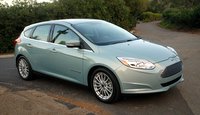
So consider the Ford Focus Electric. One of the early entrants in the electric car race. Dutifully vetted and tested by a company dedicated to electrifying its vehicles. Uses a solid platform that gets good marks in its fossil-fuel version. Made in the same factory as its gas-dependent cousins to reduce costs. The Focus Electric was overshadowed last year in spite of a pickup of 13 percent in sales as the new kids—the BMW i3, Mercedes B-Class Electric, VW e-Golf and Kia Soul EV all blasted past. For all its relative success, the Ford fell to 10th place in December 2014 among the growing field of battery-only models. Its consolation is that sales throughout the year kept it a solid fifth place in the segment. Of course, the segment-leading Nissan Leaf chugs along setting new sales records every month.
All the more curious is how this played out with the Focus’ plug-in hybrid brethren at Ford, the Fusion and C-Max Energi. Both of them enjoyed positive years as well, but they ended up the year strong, finished right after the Chevy Volt for the top spot in the plug-in hybrid segment, dropping only one place in their full-year sales totals.
The plug-in hybrids outsold the battery Focus by a substantial margin, so the question to Ford marketers might be—are Ford buyers even aware of the EV?
2014/2015 Sales
In 2014 sales Ford sold 1,964 Focus Electrics compared to 1,738 in 2013, though it only retailed 53 in December. During the first two months of 2015, the Big 3 (Tesla, Leaf, BMW i3) sold thousands of cars; the mid-level newcomers (VW/MBZ) sold in the 300s; Fiat/Ford/Smart/Spark (236/230/223/205 respectively) were in the next tier, while Kia Soul (117) rounded out the Top 10. Falling off the chart—literally and figuratively, were the Mitsubishi I, Toyota RAV4 EV and Honda Fit EV.
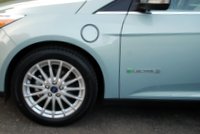
Taking nothing away from either its hot new electric competition or its plug-in with a backup engine stablemates, the Ford Focus Electric does deserve some attention for its own sake. It’s a viable contender in this growing market and acquits itself well as an around-town cruiser.
At its core, it is Ford Focus with an electric drivetrain, a sheep in wolf’s clothing to twist a fairy tale phrase. The fairy tale aspect is apt since as good as this EV is, it is not ready to replace its gasoline-breathing twin. It’s the same old story—limited range and long charging times. Another way of looking at it that turns this on its head is the Ford Focus Electric as a stealth car. It’s good-looking, though not a stand out like its big brother Fusion, but it can pass itself off as just another Focus out for a quiet drive. The few distinguishing features, like its charge port, will never give it away if that’s your desire.
Distinguishing Features
We mentioned it was quiet. Make that—it is super quiet! All EVs by their nature are quieter than gas and diesel-powered cars, but the Focus stands out among EVs as one that (counterintuitively) makes you aware of how quiet it is. We think that is part of what makes the Focus feel like a more upscale car than its gasoline twins.
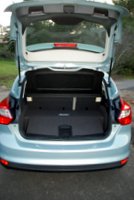
One feature we liked about the Focus Electric (and it’s shared to a degree with plug-in and hybrid Ford models) is that you get plenty of feedback on both the car and how you’re managing it. Like a gentle school teacher, the Focus tells you the miles you’ve driven, how many of those were regen miles (creating by energy created from brake regeneration on stopping and slowing), a braking score (to let you know how you’re doing regenerating those brake miles), an acceleration score (designed, of course, to moderate your more aggressive driving habits) and cruising scores that reinforce smoother driving.
Those same controls with all of their wonderful information were complicated, though. For the new and part time driver they are far from intuitive, they tended to either send me thumbing through the owner’s manual or giving up all together.

The Ford Focus Electric does have aggressive regen, which helps extend its range, and has smooth power, lending itself to smooth acceleration and a good road feel. The size feels right for an electric car, which is not too small and without compromise in functionality because of its electric drive. The car has an upscale feel, which is what you might want from a compact sedan stickering at $36,990 including a $795 delivery/destination charge. The only option on our test model were leather seats at $995. Even with generous lease deals, the car poses a challenge for all but those with a fully vetted economic portfolio.
The Plug-in Dance
While the Focus came with a Monroney label that indicated it was set to deliver 105 mpge (miles per gallon equivalent, an electric car approximation based on its energy consumption) average, or 110 in the city and 99 on the highway. Of course this is based on the electric motor and doesn’t measure the range on a full charge of the battery, which is substantially less. I didn’t feel comfortable in the Focus going much beyond 60 miles on a charge, though the gauge indicated it might have another 20 miles of range. It may be me, but some electric cars are more confidence-inspiring than others when it comes to pushing the range envelope.
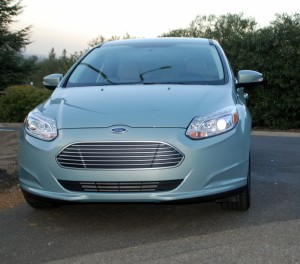 Part of what factored into that lack of confidence was an incident during my test week. The Focus was parking in the driveway in a cool evening. I had noted the state of charge and expected range when I drove in the night before. In the morning, I fired up the car and pulled out onto the road. A quick glance at the range told me more than two miles were lost overnight. Other than a car with a leaking gas tank, I’ve never experienced that kind of drop of fuel in a car. It’s particularly acute because in the current version of electrics, every mile is precious and to lose a couple that serendipitously just didn’t feel right.
Part of what factored into that lack of confidence was an incident during my test week. The Focus was parking in the driveway in a cool evening. I had noted the state of charge and expected range when I drove in the night before. In the morning, I fired up the car and pulled out onto the road. A quick glance at the range told me more than two miles were lost overnight. Other than a car with a leaking gas tank, I’ve never experienced that kind of drop of fuel in a car. It’s particularly acute because in the current version of electrics, every mile is precious and to lose a couple that serendipitously just didn’t feel right.
That leads to the other truism for the Focus and other similar electric cars. For the occasional EV driver, particularly one without ready access to a home or work charging station, life with a pure battery car becomes a plug-in dance. You factor how far you have to go on a given trip, whether there’s a convenient charger near the destination, where the chargers are close to your home, who can give you a ride back from the charger after you plug in (and take you back later), and so on. As has been said, driving an EV is a wonderful experience, but it is a life-changing one as well.
Basic Specifications
The 2014 Ford Focus Electric I drove had an electric motor rated at 143 horsepower (107 kW). It also has a liquid-cooled 23 kWh lithium-ion battery that can be fully recharged on an optional
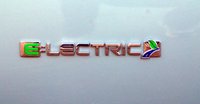
240-volt Level II charger in 3.6 hours. The five-door compact hatchback can seat five adults but is more comfortable for four. The standard feature list is pretty long and includes a premium Sony audio system with nine speakers, heated seats and a laundry list of other features.
Warranties
The Focus Electric has a full complement of warranties, including:
- 8-year/100,000-mile Battery and electric components
- 5-year/60,000-mile Powertrain
- 5-year/60,000-mile Roadside assistance
- 3-year/36,000-mile Bumper-to-bumper
Final Thoughts
My time in the 2014 Ford Focus Electric has caused me to rethink some of my thoughts on the labeling of EVs. While the window label shows a 105 mpge (miles per gallon equivalent) for the Focus, in reality the more important numbers were its full-charge range of 76 miles as measured by the EPA because that is what creates the parameters of the vehicle’s use. It also lists 32 kW-hrs /100 miles, which could become significant as we gain more familiarity with electric vehicles.
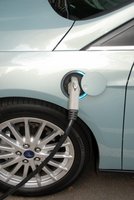
The other important number that underscores the reason for owning an electric car is the $600 annual fuel cost (@12 cents/ kW-hr). The final number for the Focus is the current (March 2015) lease deal available. With it you can get this five-door hatchback for $236/month on a 36-month lease with $881 done (not a bad deal for a 2015 model with a $29,170 starting MSRP).
How those numbers fit into your lifestyle and budget are what are going to tell you whether the Ford Focus Electric is for you.
Related Stories You Might Enjoy:
Road Test: 2014 BMW i3
Road Test: 2015 e-Golf
Road Test: 2013 Nissan Leaf

8 thoughts on “Road Test: 2014 Ford Focus Electric”